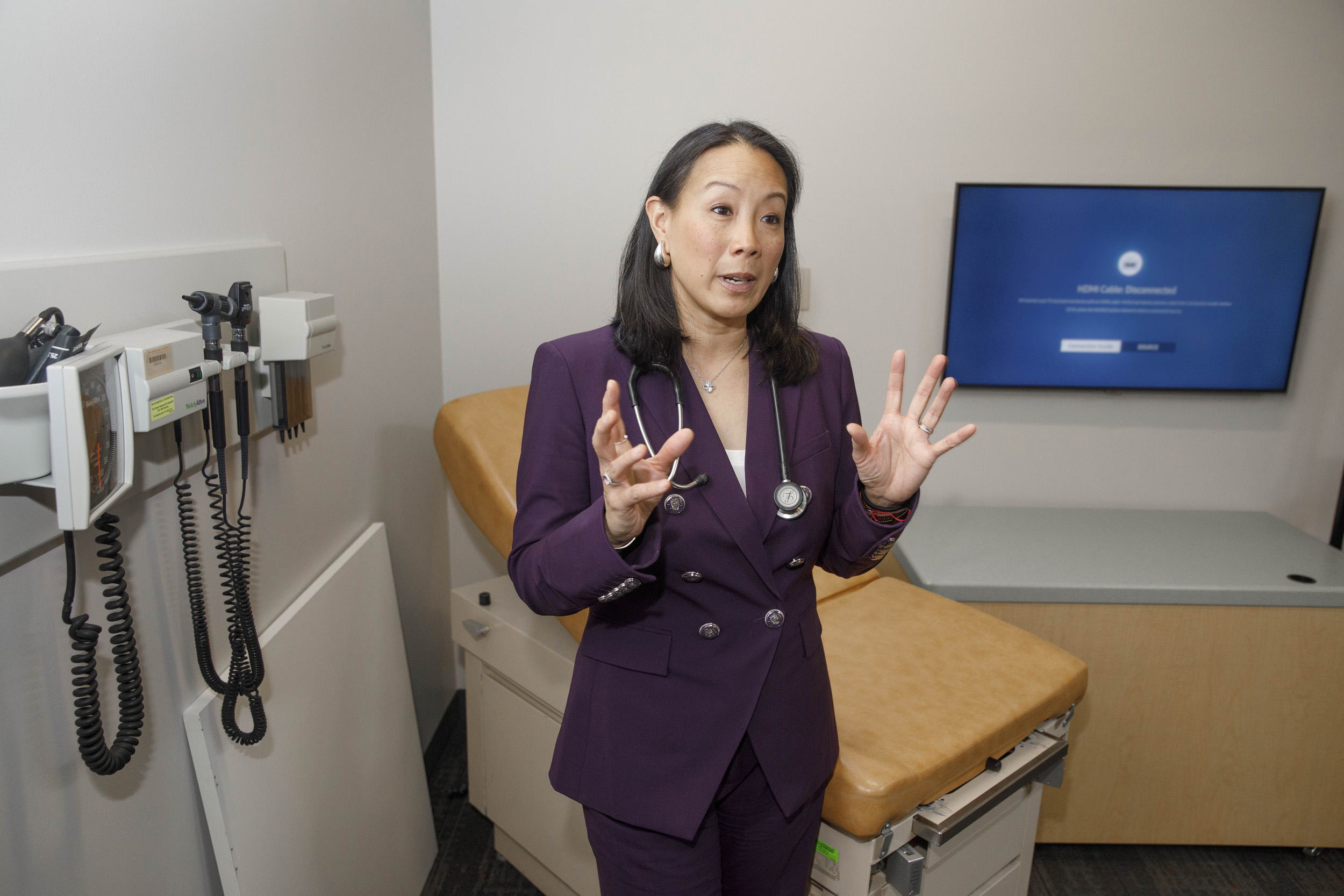
Kris Snibbe/Harvard Staff Photographer
Cancer keeps coming for the young. Why?
Harvard’s Kimmie Ng among gastrointestinal specialists hunting culprit behind global disease wave
A report released last month by the American Cancer Society reflects significant progress in recent decades in early detection and treatment of the disease. That’s the good news. The report also highlights a disturbing new development: Higher rates of colorectal cancer among younger people. Kimmie Ng, an associate professor of medicine at Harvard Medical School and the founding director of Dana-Farber’s Young-Onset Colorectal Cancer Center, has seen this trend close-up. There’s no clear cause behind the surge, she says, but researchers are keenly interested in the “birth-cohort effect” and the potential role of environmental factors. The interview has been edited for clarity and length.
Looking at the landscape broadly, how are we doing with cancer in the U.S.?
Overall, there is good news. The number of cancer deaths has decreased significantly since the previous report. That suggests that we’ve had substantial treatment advances and, for the cancers that have screening programs, increased compliance. That has led to detection of earlier-stage cancers that are more curable. The combination of those factors has led to an overall decrease in cancer deaths, which is very encouraging.
But what concerns us is what we’re seeing in the clinic every day: More young people, otherwise healthy with no genetic syndrome, being diagnosed with very advanced stages of gastrointestinal cancers. For men under 50, colorectal cancer is now the leading cause of cancer-related death, surpassing central nervous system tumors as well as lung cancers. In women under 50, it is now the second leading cause of cancer death. These are concerning numbers and we are all working hard to understand why this is happening.
What’s your sense of possible culprits?
We see this generational change — a “birth cohort effect” — in the rise of young-onset cancers. That leads us to suspect that a recent change in an environmental exposure or a combination of exposures is contributing to the rise. The main hypothesis is that some not-as-yet-identified environmental exposure is affecting individuals, starting in early life. The exposure perhaps occurs in utero, in infancy, or during childhood. That then predisposes us to cancers at an earlier age. A lot of work has been focused on what the environmental exposures may be and what they might be doing biologically to lead to cancer development at a younger age.
“The main hypothesis is that some not-as-yet-identified environmental exposure is affecting individuals, starting in early life.”
Kimmie Ng
Do you have a favored explanation — an area where you are focusing your research?
We focus on known risk factors for colorectal cancer, which is most strongly linked to diet and lifestyle factors, regardless of age. It does seem to be digestive system cancers, as a group, that are rising in young people, so there are thoughts that there’s a shared underlying etiology related to obesity — a lot of these cancers are linked to obesity.
But I have to say, most of our patients are not obese. Many are marathon runners. Many follow very healthy diets, eat organically. So we don’t know if it’s just diet and lifestyle factors or other things in our environment — pollutants, preservatives in our food. A recent paper on microplastics generated a lot of interest.
When we talk about in utero exposures, is that a situation where environmental hazards play a role?
Potentially. Certainly, maternal influences are passed to the fetus when it’s in utero, but after birth, maternal factors may still influence health risks later in life. We did a study on whether breastfeeding in infancy has any relationship to development of colorectal cancer. Very surprisingly, we found that being breastfed in infancy led to increased risks of developing colorectal cancer. We were surprised and we certainly don’t want to discourage breastfeeding. It has many other health benefits that probably outweigh the small increased risk of colorectal cancer. But it’s intriguing that as early as infancy, environmental exposures probably matter.
We’ve been talking mainly about the United States. How do we compare internationally?
This is a global phenomenon. In higher socioeconomic countries, where there are screening programs for colorectal cancer, rates are declining nicely in those over 50. For those under 50, the curve is going the opposite way, mirroring what we are seeing in the U.S. We are now seeing rises in young-onset gastrointestinal cancers in all parts of the world. Whatever is happening, we need to study this on a global level.
Screening recommendations for colorectal cancer changed recently from age 50 to 45. Do we need to go even lower?
Lowering the screening age would significantly aid in cancer prevention and decrease cancer mortality in those eligible for screening. That being said, the steepest rises that we’re seeing in this disease are in the very youngest people, those in their 20s and 30s, and they’re not eligible for screening even with the new guidelines. It’s unlikely that the U.S. Preventive Services Task Force will lower the screening age any further, so the approach that we all believe needs to be taken, urgently, is to better understand risk factors and underlying causes so that we can identify those 20-year-olds and 30-year-olds at high risk and target those folks for earlier screening.





